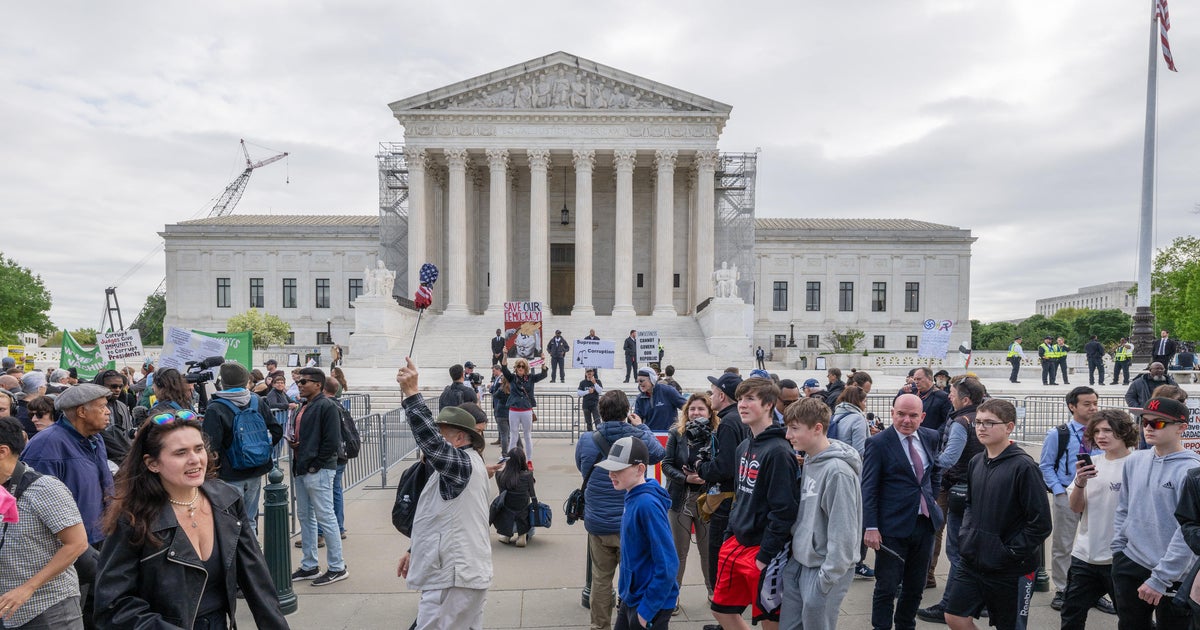Supreme Court sides with Trump on speedy deportations of asylum-seekers
The Supreme Court on Thursday ruled that migrants placed in fast-tracked deportation proceedings can't appeal negative asylum decisions in federal court, finding that speedy removals don't violate due process rights or constitutional protections against unlawful detention.
In a 7-2 decision authored by Justice Samuel Alito, the court said asylum-seekers whom the government seeks to summarily deport are not entitled to seek habeas corpus. The opinion from Alito, a conservative jurist appointed by President George W. Bush, said a 1996 immigration law that authorized these speedy deportations for border-crossers is constitutional.
The ruling vacates a decision by 9th Circuit Court of Appeals that found that a provision in the 1996 law barring judicial oversight of expedited removals violated the due process and suspension clauses in the Constitution. The suspension clause stipulates that the right of habeas corpus can only be suspended in times of rebellion or invasion.
Alito was joined by the rest of the high court's conservatives in ruling for the administration, as well as liberal justices Ruth Bader Ginsburg and Stephen Breyer, who filed a concurring opinion. Justices Sonia Sotomayor and Elena Kagan dissented.
Lee Gelernt, the American Civil Liberties Union lawyer who argued against the 1996 law before the Supreme Court in March, denounced Thursday's decision. "This ruling fails to live up to the Constitution's bedrock principle that individuals deprived of their liberty have their day in court, and this includes asylum seekers," Gelernt said. "This decision means that some people facing flawed deportation orders can be forcibly removed with no judicial oversight, putting their lives in grave danger."
At the center of the case behind Thursday's ruling is Vijayakumar Thuraissigiam, a migrant from Sri Lanka who was apprehended by U.S. officials at the southern border and placed in the "expedited removal" proceedings created by the 1996 law.
Border-crossers processed under this law face summary deportations unless they can prove to an asylum officer they have credible fear of being persecuted or tortured in their home countries. A supervisor must sign off on the asylum officer's finding.
If the asylum-seeker is found to have credible fear of being harmed, they are placed in full and often lengthy proceedings before an immigration judge and allowed to request relief from deportation, like asylum. If the credible-fear finding is negative, migrants can file an appeal before an immigration judge. The judges can either set aside the asylum officer's finding or affirm it, which subjects the asylum-seeker to deportation.
Thuraissigiam told an asylum officer he was brutally assaulted in Sri Lanka and hospitalized as a result, an account the U.S. official found credible. However, the asylum officer and a supervisor determined Thuraissigiam did not establish why he was persecuted. An immigration judge affirmed their negative decision.
The asylum-seeker then filed a habeas corpus petition before a federal district court, saying he would face persecution if deported because of his membership in the Tamil minority in Sri Lanka, a country that has been plagued by ethnic strife. A federal judge dismissed the petition, citing the 1996 immigration law.
Thuraissigiam's lawyers appealed and received a favorable ruling from the 9th Circuit Court of Appeals, which was struck down Thursday.
In his ruling, Alito said Thuraissigiam was offered due process through the provisions in the 1996 law and that he was not entitled to receive other constitutional protections because he was apprehended 25 yards into American territory. "An alien who is detained shortly after unlawful entry cannot be said to have 'effected an entry,'" Alito wrote.
Alito also said Thuraissigiam's processing did not violate the suspension clause because, in his view, the Sri Lankan migrant was not merely asking for a "release from custody, but an additional opportunity to obtain asylum."
"While respondent does not claim an entitlement to release, the Government is happy to release him — provided the release occurs in the cabin of a plane bound for Sri Lanka," Alito continued.
In her dissent, Sotomayor said the majority misinterpreted the protections the Constitution offers to anyone on U.S. soil, even migrants who cross the border without authorization. "In doing so, the Court upends settled constitutional law and paves the way toward transforming already summary expedited removal proceedings into arbitrary administrative adjudications," she wrote.
In a statement late Thursday, acting Homeland Security secretary Chad Wolf called the ruling a "victory for law and order and the American public."
"For too long illegal aliens have abused our immigration system knowing they do not have the right to be here. This administration will not stand for these vicious cycles of exploitation of our legal system," Wolf said. "Today's decision ensures that expedited removal, a vital tool for combating illegal immigration, will remain expeditious."




